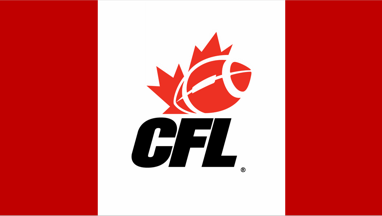 image from Pete Loeser, 14 December 2022
image from Pete Loeser, 14 December 2022Canadian Football League Flag 2002

Last modified: 2023-02-18 by rob raeside
Keywords: canadian football league | football |
Links: FOTW homepage |
search |
disclaimer and copyright |
write us |
mirrors
 image from Pete Loeser, 14 December 2022
image from Pete Loeser, 14 December 2022
Canadian Football League Flag 2002
On this page:
The birth of professional American style Football both in Canada and the United States are intertwined. It began in both countries at the college level as a type of Rugby-Football. In Canada by 1874 McGill University had developed its Rugby program with their own set of rules which were a combination of today's Rugby and Football rules. McGill University decided that they wanted to challenge Harvard University in the United States to a couple games of Rugby-Football which both schools had teams, but there were differences both in rules and type of play that the universities used. One of the difference was that McGill used a predecessor of today's pointed oval American football, while Harvard was using a predecessor of the modern round soccer ball.
The first game was played on May 14 1874, when the McGill team traveled to the United States it became the first international sports event in the New World. They used the oval type football (Harvard won 3-0), but the next day a round soccer type ball was used as the oval one had strangely disappeared. The second game ended in a 0-0 tie. In the following months the oval ball become favored by both teams. When Harvard made a trip to McGill it became the first intercollegiate game in Canada. (Harvard won this games also) In the following years, both in the United States and Canada starting to develop rugby football into what we know today as American Football.
In the United States the National Football League (NFL) was founded in 1922 as the first professional American Football League, and in 1956 the Canadian Football League (CFL) became the first professional Canadian Football League when the two top Canadian football leagues in the country - the Interprovincial Rugby Football Union and Western Interprovincial Football Union - merged as the Canadian Football Council (CFC). In 1958 the CFC separated from the governing Canadian Rugby Union and became the Canadian Football League. During the early years of the Canadian Football League there were professional teams franchised in Canadian cities and between 1993-1995 some in United States cities. Examples would be the Sacramento Gold Miners (later relocated to become the San Antonio Texans), the Las Vegas Posse, the Baltimore Stallions, the Birmingham Barracudas, the Shreveport Pirates, and the Memphis Mad Dogs. The Baltimore Stallions became the only non-Canadian team to win the Grey Cup in 1995. The CFL returned to an all-Canadian team format in 1996.
Today the Canadian Football League consists of nine teams, each headquartered in a city in Canada. They are divided into two divisions: four teams in the East Division and five teams in the West Division. Each team plays an 18 game regular season between mid-June to early November, followed by the top six teams competing in the league's three-week playoffs. The championship game is called the Grey Cup which is held in late November. This is similar to the Superbowl held in February by the NFL in the United States. (source)
Pete Loeser, 14 December 2022
There are nine teams in the CFL. They are divided into two divisions: four teams in the West Division and five teams in the East Division.
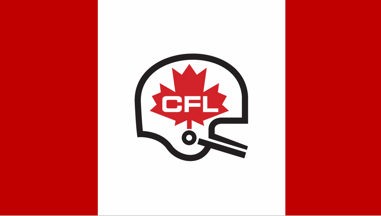 image from Pete Loeser, 14 December 2022
image from Pete Loeser, 14 December 2022
Based on this image
This was the Canadian Football League Flag between 1970 and 2002. In 2002 the football helmet logo was updated using their new logo with a stylized football and Maple Leaf centered on the white stripe of the flag.
Pete Loeser, 14 December 2022
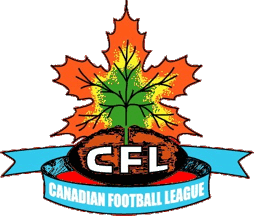 c1955
c1955
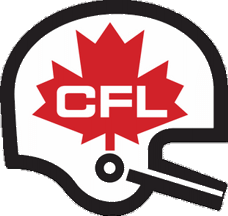 c1969
c1969
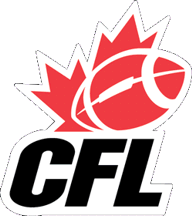 c2002
c2002
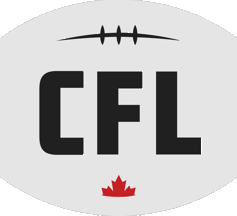 c2015
c2015
images located by Pete Loeser, 14 December 2022
There have been a series of official and unofficial logos for the Canadian Football League. There has also been a host of unofficial variant logos of these logos used in publications and on websites. Controversy exists as to what year they first appeared.
Pete Loeser, 14 December 2022
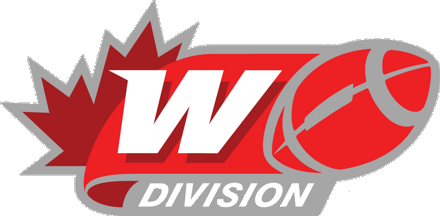
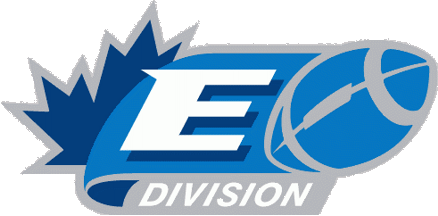
images located by Pete Loeser, 11 December 2022
The CFL is divided into two divisions: four teams in the East Division and five teams in the West Division.
Pete Loeser, 14 December 2022
All the CFL (Canadian Football League) teams receive funding from Ottawa to stick a maple leaf on the back of the helmet - I wonder if the Baltimore team did the year it was in the CFL.
Rob Raeside, 1 February 2001
While I cannot answer for the Baltimore team, but the Sacramento Gold Miners and the Las Vegas Posse (yes, there were more US Canadian Football League teams than Baltimore) had the maple leaf on their helmets and commercial sports gear (t-shirts and the like) and flew the Canadian flag at games. The flying of the Canadian flag may have been because most of the opponents were from Canada, I never saw a game between two US teams.
Michael P. Smuda, 1 February 2001
The flags on the helmets were not simply decorative. Only players of Canadian citizenship were allowed to have the Maple Leaf sticker on their helmets. This came into play with the "Canadian content" rules of the game, which stated that teams had to have a certain number of Canadians on the roster, and of those, a certain number had to be in play at any given moment. The U.S. teams (Baltimore, Las Vegas, Birmingham, San Antonio, Memphis, and Sacramento) were not subject to those restrictions as it would have been counter to U.S. labor laws, and I do not recall seeing maple leaves on their helmets.
The Baltimore Stallions, who were in the league two years, 1994 and 1995, had Canadian players on their practice roster, but to my knowledge never fielded a Canadian player. They did at one point have the CFL logo, a red Maple Leaf emblazoned with the letters "CFL" in white, as part of the team's logo.
I did witness all CFL teams playing in the United States (Memphis at Baltimore, and the 1995 Southern Final, San Antonio at Baltimore). Canadian flags were flying in the stadium, but this was nothing new - Canadian flags ordinarily fly at Baltimore stadiums, since most Baltimore sports teams (the Orioles, Baltimore's Major League Baseball team, in this case) are in leagues which also feature Canadian teams (Toronto and Montreal).
Stever Kramer, 1 February 2001
It sounds like maple leaf stickers were used to indicate Canadian Players, but I wonder were US flag stickers used by the American (US) players on their helmets? I could find nothing about this.
Pete Loeser, 14 December 2022
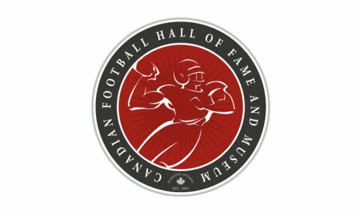 image from Pete Loeser, 14 December 2022
image from Pete Loeser, 14 December 2022
The Canadian Football Hall of Fame (CFHOF) and Museum is located in Hamilton, Ontario. According to their website "...artifact collections were started in the early 1960s and have increased to over 30,000 items consisting of trophies, helmets, playing equipment, game and record balls, jerseys, sweaters, jackets, flags, banners, photographs, films and videos. The collections from a major part of the on-site and off-site exhibitions...are used extensively as part of the education programs to teach visitors about the history of Canadian Football." (source)
Pete Loeser, 14 December 2022
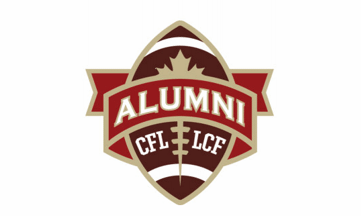 image from Pete Loeser, 14 December 2022
image from Pete Loeser, 14 December 2022
The Canadian Football League Alumni Association (CFLAA) is similar to a veterans association. It is open to any person who has played CFL football in Canada. According to their website the "...CFLAA supports former CFL players, Canadian football, and other communities of interest while fostering collaborative relationships with the CFL stakeholders and others that enhance the well-being of our members and friends." (source)
Pete Loeser, 14 December 2022